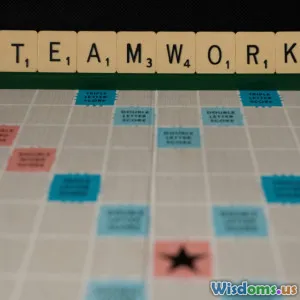
Mastering Delegation Skills for Busy Team Leaders
9 min read Essential strategies for busy team leaders to master delegation and boost team productivity without burnout. (0 Reviews)
Mastering Delegation Skills for Busy Team Leaders
In today’s fast-paced organizational landscape, team leaders often find themselves overwhelmed by the sheer volume of responsibilities they must juggle. The modern leader isn’t just a strategic thinker but also a task manager, people developer, and problem solver—all rolled into one. Yet, the stark truth is that effective leadership hinges on one critical ability: delegation.
Introduction
Why is delegation so crucial for busy team leaders? Because without it, they risk bottlenecks, burnout, and underutilization of their team’s potential. Contrary to common misconceptions, delegation doesn’t just free up your schedule—it empowers your team to grow, develop new skills, and contribute meaningfully.
Historically, some leaders held on tightly to their tasks, fearing loss of control or doubting their team's capabilities. However, in today’s data-backed leadership environment, we know that effective delegation—done right—improves operational efficiency by up to 33%, fosters innovative cultures, and elevates employee engagement significantly.
In this guide, we'll delve deep into mastering delegation, breaking down actionable strategies to help busy team leaders delegate tasks effectively while amplifying team performance and personal leadership influence.
Understanding Delegation: The Foundation of Effective Leadership
What Is Delegation?
At its core, delegation is the strategic process of entrusting responsibility and decision-making authority for a task to another individual. It is not simply passing off unwanted chores; rather, it’s an intentional assignment of duties paired with accountability.
Management studies reveal that leaders who delegate effectively witness a 56% increase in overall team productivity. Plus, delegation nurtures employee growth by empowering them with skill development opportunities.
Common Barriers to Delegation
Many leaders struggle to delegate due to:
- Control Issues: Fear of losing grip on project quality.
- Perfectionism: Belief that only they can execute a task properly.
- Lack of Trust: Doubt in team capabilities or commitment.
- Unclear Communication: Difficulty articulating expectations.
Identifying which of these barriers hold you back is the first step toward improvement.
The Anatomy of Mastering Delegation
1. Identify the Right Tasks to Delegate
Not every responsibility suits delegation. Leaders should evaluate tasks by asking:
- Does this require my unique expertise?
- Is this task repetitive or procedural?
- Could this be a growth opportunity for a team member?
For example, in a marketing team, a leader might delegate routine content scheduling to a junior member but retain strategy development, which demands senior insight.
According to a Harvard Business Review study, approximately 60% of leaders report that task selection is paramount to delegating effectively.
2. Know Your Team’s Strengths and Growth Areas
Delegation must align with individual skills and stretch capabilities without setting up for failure. A pragmatic leader uses tools such as skills inventories and regular one-on-one meetings to keep tabs on team strengths and developmental areas.
Take the example of Satya Nadella, CEO of Microsoft, who actively encourages leaders to tap into diverse talents by understanding their teams' skill matrices—a key factor behind Microsoft’s cultural transformation.
3. Communicate Clear Expectations and Objectives
A significant fallout of poor delegation is misaligned tasks leading to frustration. Setting clear goals, defining deliverables, deadlines, and success criteria upfront eliminates ambiguity.
Use SMART criteria (Specific, Measurable, Achievable, Relevant, Time-bound) to frame delegated tasks.
4. Provide Authority and Resources
Delegation is hollow without granting appropriate authority. Assign team members the decision-making power they require and equip them with tools, access, and information essential for success.
For instance, a tech lead delegating bug fixes should ensure the developer has access to code repositories and issue trackers.
5. Create a Feedback and Support System
Even with delegated tasks, leaders must maintain visibility without micromanaging. Regular check-ins, open channels for questions, and constructive feedback loops help keep progress on track.
A Gallup report highlights that employees who receive regular feedback are 21% more productive.
6. Trust but Verify: Balancing Oversight
Effective delegation embodies a balance—giving autonomy while monitoring progress. Leaders should cultivate trust but also establish monitoring methods, like weekly progress reports or dashboards, avoiding control obsessiveness.
Real-World Examples of Effective Delegation
Google's Project Aristotle
Google’s Project Aristotle uncovered that team dynamics trumped individual brilliance. Delegation was critical here—not just tasks but decision-making around project goals was distributed, empowering members.
Project leads delegated data analysis to experts, while judgment and overall direction remained with core leadership. This mix sped problem-solving and fostered shared ownership.
Elon Musk’s Approach at Tesla
Known for his hands-on style, Musk delegates tasks extensively across Tesla’s engineering teams, giving heads of engineering segments ownership with freedom. This liberated his time to focus on strategic innovations.
He emphasizes communication and resource provision, ensuring that each team has what they need to execute large-scale projects independently.
Tips and Tools to Enhance Delegation Skills
Use Delegation Matrices
A RACI matrix (Responsible, Accountable, Consulted, and Informed) clarifies roles before tasks are assigned, reducing confusion.
Digital Tools for Delegation
Platforms like Asana, Trello, and Monday.com help allocate tasks clearly, assign deadlines, and track progress in real-time, supporting transparent delegation.
Train Your Team
Building delegation readiness happens through training. Workshops on decision-making, problem-solving, and time management cultivate an empowered workforce.
Conclusion: Delegation as a Strategic Tool for Leadership Success
Delegation for busy team leaders is less about relinquishing control and more about multiplying leadership effectiveness. By strategically assigning tasks based on thorough assessment, clear communication, and resource allocation, leaders unlock productivity, enhance team morale, and foster professional growth.
Successful delegation transforms a team from a collection of individuals into a cohesive unit driving toward shared goals. It is a potent antidote to leadership burnout and a gateway to sustainable success.
Take the first step today: evaluate your current to-do list, identify what you can delegate, know your team better, and watch the multiplier effect of effective delegation unfold.
As leadership expert John Maxwell aptly put it, “A leader who produces other leaders multiplies their influences.” Delegation is the cornerstone of this multiplication.
References:
- Harvard Business Review, "The Right Way to Delegate"
- Gallup, "State of the American Workplace Report"
- Project Aristotle Research, Google
- Maxwell, John. "The 21 Irrefutable Laws of Leadership"
Rate the Post
User Reviews
Popular Posts




















